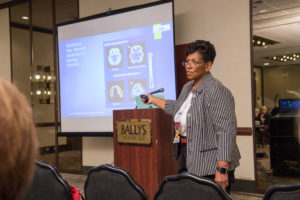As the opioid epidemic continues to grow throughout the nation, it’s not surprising that this kind of addiction, as well as others, can also affect nurses. If you’re a nurse in New Jersey and have a problem with addiction, however, there’s a treatment program specifically designed to help you.
Established in 2003, the New Jersey State Nurses Association (NJSNA) Recovery and Monitoring Program (RAMP) has helped more than 2,000 impaired nurses since its inception, says Terri Ivory, RN, MSN, Director of NJSNA. “RAMP is the only program for registered nurses and licensed practical nurses of its kind contracted through the Board of Nursing,” explains Ivory. “RAMP is important because it supports impaired nurses and protects their licenses so they will be able to work again with monitoring once they have completed evaluation and treatment. What makes the program special is that nurses are taking care of nurses who understand the challenge of being a nurse.”
Ivory agreed to answer questions about the program. Following is an edited version of our interview.
Tell us about RAMP.
 The goals of the program are to provide safety to the public though early detection and monitoring, reduce the time between identification and treatment, and provide a process for the nurse to recover that is non-punitive and non-public.
The goals of the program are to provide safety to the public though early detection and monitoring, reduce the time between identification and treatment, and provide a process for the nurse to recover that is non-punitive and non-public.
Entering the RAMP program, which is voluntary, protects the nurses’ licenses. While in the recovery phase, the nurses’ licenses may become inactive, but not revoked, which protects the licenses. The licenses can be re-activated once the process is completed and the return to work is issued.
How does it work? Is it a rehab/detox? Do you provide counseling?
RAMP is a recovery and monitoring program, which means it makes referrals for treatment, detox, and counseling. It is not rehab and detox nor does it do counseling.
The RAMP process includes evaluation, toxicology screenings, referral for treatment, weekly peer support group meetings, monthly reports, check-ins, monitoring, and a return to work process. There are peer support groups that RAMP participants must take part in during their time in the program.
Are all nurses accepted into the program? Do they need to apply? Does their employer get notified?
All RNs and LPNs practicing in New Jersey are eligible for the program and can be self-referred or referred by their employer or the public (such as family, attorney, friend). After a nurse self-identifies or is referred to RAMP, the first thing that happens is an evaluation process, which includes a psychological evaluation and random toxicology testing that can take up to 90 days. Nurses must check in with RAMP every day during the evaluation phase. During this time, the nurses do not need to disclose to their employers that they are in the program.
After evaluation, the nurse will get recommendations—whether to stay in the program or discharge—based on the results of the evaluation. If it is recommended a nurse stay in the program, the nurse must disclose the program participation to her/his employer.
Participation in the program may last up to five years.
RAMP notifies the New Jersey Board of Nursing (NJBON) as soon as the referral comes in, and the NJBON works with RAMP throughout the process. Dialogue with NJBON happens every two weeks or more often as needed. If nurses do not comply with recommendations, they are discharged from the program and reported to the BON.
It is within the nurses’ scope of practice to report fellow nurses.
Do the nurses pay for the program or is it covered by insurance?
Insurance does not pay for the program itself, which includes lab fees, evaluation fees, peer group fees, and therapist fees. All fees must be paid up front.
Hard medical costs, such as a lab fee or therapist, might be covered by medical insurance.
If they complete the program, how do they get back to working as a nurse? What tends to happen?
During their time in the program, a return-to-work program is implemented. Sometimes there are restrictions on work hours (no overtime), medication administration, and on specialty or place of employment. Nurses are monitored while they are working and monthly reports are sent to RAMP. Monitoring can be done for up to 5 years. Upon return to work, the only person that knows about the nurses’ participation in RAMP is the potential supervisor and human resources.
What have your outcomes been?
The overall success rate of the program is 60%. There are a total of 607 nurses in the program as of October 31, 2017: 493 nurses being monitored, 27 in intake stage with 23 monitoring out-of-state with 36 peer support groups, and five mental health groups. Two hundred thirty participants have been discharged as of October 31, 2017.
The most important thing for nurses to know is not to be afraid to report, either self-reporting or peer reporting. This helps close loop and gets the nurse the help they need. The main goal of the program is to have nurses to practice safely, protect the public, and protect the nurse.
RAMP has a 24-hour hotline for questions: 800-662-0108.
- What an MSN Can Do for You - October 18, 2023
- The National League for Nursing: Connecting the Academic and Clinical Worlds for 130 Years - August 16, 2023
- Treating Burnout, Trauma, and Grief with Dance - July 14, 2023



